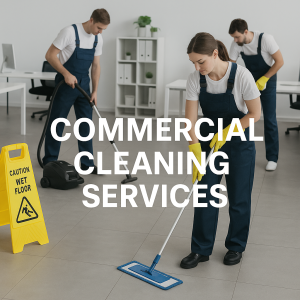How Often Should You Schedule Commercial Cleaning in Sydney?
A clean, hygienic workspace is essential for businesses to maintain a professional appearance, ensure employee wellbeing, and boost productivity. One of the most common questions businesses have is how often they should schedule commercial cleaning for their premises.
While there is no one-size-fits-all answer, understanding the factors that influence cleaning frequency will help you create a plan that keeps your workspace consistently clean and supports your business goals.
Why Regular Commercial Cleaning Matters
Regular commercial cleaning ensures your workspace is free from dirt, dust, allergens, and germs that can affect employee health and leave a negative impression on clients. Clean offices promote productivity, reduce sick days, and extend the lifespan of carpets, furniture, and office equipment.
For businesses operating in Australia, maintaining a high standard of cleanliness helps meet workplace health and safety standards, providing peace of mind for your staff and clients.
Factors Influencing Cleaning Frequency
1️⃣ Type of Business
Different industries have different cleaning requirements. Medical offices, childcare centres, and gyms require daily cleaning to maintain strict hygiene standards, while low-traffic offices may only require cleaning a few times per week.
2️⃣ Foot Traffic
The number of people coming in and out of your workspace impacts how quickly dirt and debris accumulate. High-traffic offices, retail stores, and public-facing businesses may require daily cleaning, while lower-traffic offices may need less frequent services.
3️⃣ Office Size and Layout
Larger spaces require more frequent cleaning to manage dirt and clutter across multiple areas. Open-plan offices may require regular dusting and vacuuming, while offices with carpets may need more frequent cleaning to prevent dirt build-up.
4️⃣ Seasonal Factors
Seasons can affect cleaning needs. For example, during flu season or wetter months, it may be necessary to increase the frequency of cleaning to reduce the spread of germs and manage wet footprints throughout your workspace.
5️⃣ Specific Areas Requiring Attention
Certain areas of your workspace, such as kitchens, restrooms, and reception areas, require frequent cleaning to maintain hygiene. High-touch surfaces like door handles, light switches, and shared equipment should be sanitised regularly to prevent the spread of germs.
Recommended Cleaning Frequency
While every business has unique needs, here is a general guideline for commercial cleaning frequency:
Daily Cleaning: For high-traffic offices, medical facilities, gyms, and childcare centres. Includes vacuuming, dusting, sanitising high-touch surfaces, emptying bins, and restroom cleaning.
Three to Four Times a Week: For medium-sized offices with moderate foot traffic requiring consistent cleanliness.
Weekly Cleaning: For small offices with low foot traffic, combined with periodic deep cleans.
Monthly Deep Cleaning: Regardless of daily or weekly cleans, a monthly deep clean is recommended to target carpets, upholstery, and hard-to-reach areas.
Benefits of Scheduling Regular Commercial Cleaning
Promotes Employee Health
Regular cleaning reduces allergens, dust, and bacteria in your workspace, contributing to a healthier environment. It helps lower the risk of illnesses spreading within your team, reducing absenteeism and supporting staff wellbeing.
Enhances Workplace Productivity
A clean, clutter-free environment boosts employee focus and morale. Employees can concentrate on their tasks without distractions caused by dirty or disorganised surroundings.
Leaves a Positive Impression on Clients
Clean, well-maintained workspaces reflect professionalism and attention to detail. Clients visiting your office will feel more confident in your services when your space is clean and welcoming.
Extends the Life of Your Office Assets
Regular cleaning prevents dirt and grime from damaging carpets, floors, and office furniture, helping you avoid costly replacements and maintaining a professional environment.
Creating a Cleaning Schedule That Works for Your Business
To determine the best cleaning frequency for your office:
Assess your business type and daily operations.
Identify high-traffic and high-touch areas needing frequent cleaning.
Consider your employees’ health needs, especially during flu seasons.
Review your budget to determine the frequency that aligns with your operational goals.
Consult with a professional cleaning service to create a customised plan.
A professional cleaning company can assess your workspace and recommend a cleaning schedule that balances your business’s cleanliness requirements with your budget.
Professional Cleaning Delivers Consistent Results
Using a professional cleaning service ensures your office is consistently clean, with experienced cleaners using industry-grade equipment and eco-friendly products to maintain high hygiene standards.
Professional cleaners are trained to clean different surfaces safely, ensuring the longevity of your carpets, upholstery, and office furniture while providing a healthier environment for your employees and clients.
Scheduling regular commercial cleaning for your office is essential to maintain a hygienic, productive, and welcoming environment. By assessing your business’s unique needs, you can determine the optimal cleaning frequency to support your operations and provide a positive experience for employees and clients alike.
Whether you operate a high-traffic business requiring daily cleaning or a smaller office needing weekly services, investing in professional commercial cleaning helps keep your workspace clean and your team focused on what they do best.
